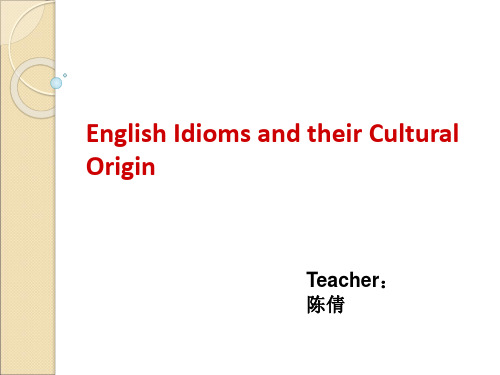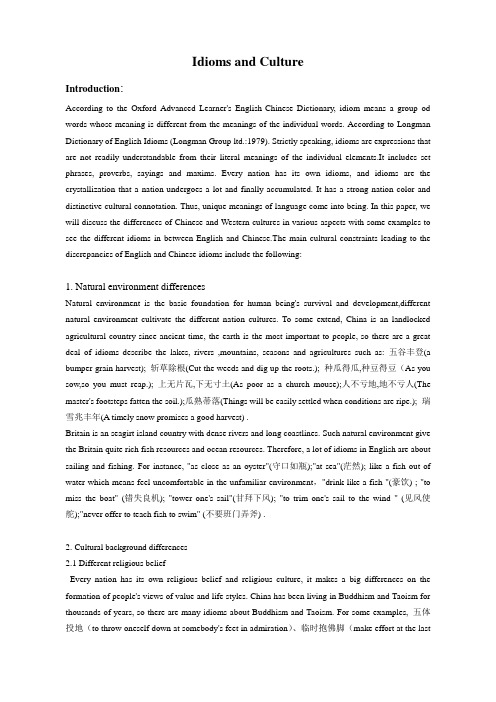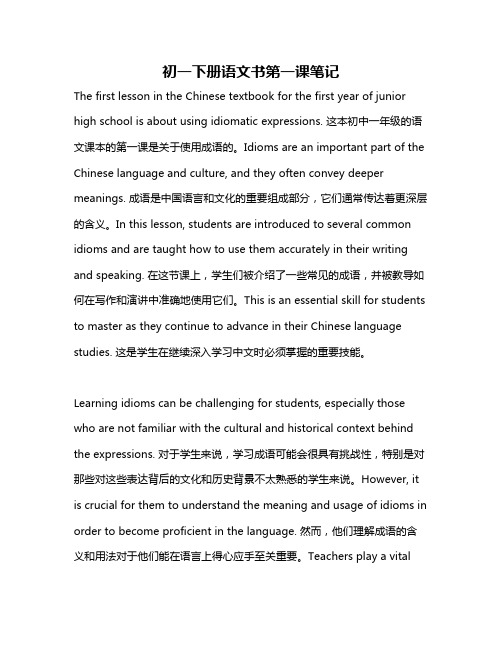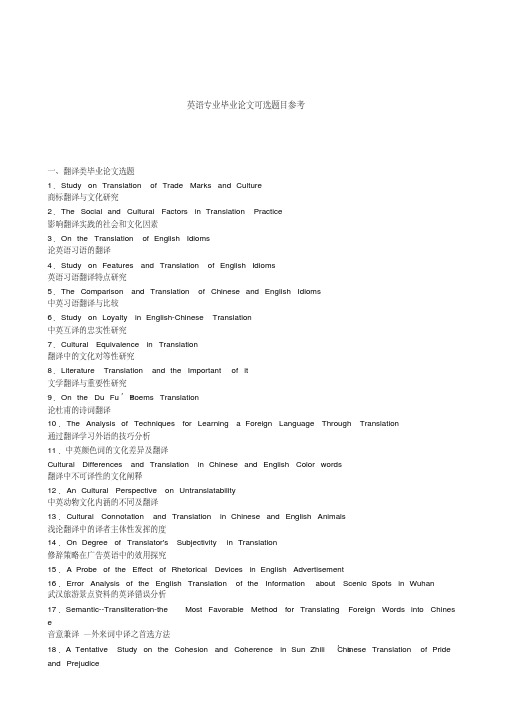idioms and culture
Idioms and Culture - Chapter 1

crocodile tears
• crocodile tears
The expression comes from an ancient anecdote(轶事) that crocodiles weep in order to lure(诱惑 ) their prey.
What is idiom ?
• kick the bucket
A third theory suggests that the origin of the phrase comes from the Catholic( 罗 马 天 主 教 ) custom of holy-water buckets: After death, when a body had been laid out ... the holy-water bucket was brought from the church and put at the feet of the corpse. When friends came to pray... they would sprinkle(洒) the body with holy water ... it is easy to see how such a saying as "kicking the bucket " came about.
Why should we learn idioms?
“most English speakers utter about 10 million novel metaphors per lifetime and 20 million idioms per lifetime. This works out to about 3,000 novel metaphors per week and 7,000 idioms per week”
英语专业毕业论文选题参考

英语专业毕业论文可选题目参考一、翻译类毕业论文选题1.Study on Translation of Trade Marks and Culture 商标翻译与文化研究2.The Social and Cultural Factors in Translation Practice 影响翻译实践的社会和文化因素3.On the Translation of English Idioms论英语习语的翻译4.Study on Features and Translation of English Idioms 英语习语翻译特点研究5.The Comparison and Translation of Chinese and English Idioms中英习语翻译与比较6.Study on Loyalty in English-Chinese Translation 中英互译的忠实性研究7.Cultural Equivalence in Translation翻译中的文化对等性研究8.Literature Translation and the Important of it文学翻译与重要性研究9.On the Du Fu’s Poems Translation论杜甫的诗词翻译10.The Analysis of Techniques for Learning a ForeignLanguage Through Translation通过翻译学习外语的技巧分析11.Cultural Differences and Translation in Chinese and English Color words中英颜色词的文化差异及翻译12.An Cultural Perspective on Untranslatability翻译中不可译性的文化阐释13.Cultural Connotation and Translation in Chinese and English Animals浅论翻译中的译者主体性发挥的度14.On Degree of Translator's Subjectivity in Translation 修辞策略在广告英语中的效用探究15.A Probe of the Effect of Rhetorical Devices in English Advertisement16.Error Analysis of the English Translation of the Information about Scenic Spots in Wuhan武汉旅游景点资料的英译错误分析17.Semantic--Transliteration-the Most Favorable Method for Translating Foreign Words intoChinese音意兼译—外来词中译之首选方法18.A Tentative Study on the Cohesion and Coherence in Sun Zhili’s Chinese Translation of Prideand Prejudice浅论《傲慢与偏见》孙致礼中译本的衔接与连贯19.Chinese Translation of Attributive Clauses in English for Science and Technology科技英语中定语从句的汉译20.Film Titles and Their Translation——A cross-cultural perspective从跨文化角度分析电影片名及其翻译21.Translating Expressions on Public Signs from Chinese into English汉语公示语英译22.论文化差异与翻译Cultural differences and translation23.商标名的翻译原则与品牌文化The Translation Principle of Brand Names and Brand Culture24.英文电影片名的翻译策略与翻译方法研究On Translation of English Film Names25.意美、音美、形美--英文商标的汉译Beauty in Sense, Sound and Form--On Translation of English Trademarks into Chinese26.中文商标英译探On the Translation of Trademarks from Chinese into English二、文化类毕业论文选题27.国际商务谈判中的双赢语用策略The Win-Win Pragmatic Strategies in International Business Negotiation28.Grice 的合作原则在国际商务谈判中的应用The Application of Grice’s Cooperation Principle in International Business Negotiation29.An Analysis on Differences between Chinese and Western Ideas on Face中西文化面子观差异对比分析30.Differences between Chinese and Western Role Awareness of Women and the Effects on TheirCareer Development 中西文化中女性角色意识差异及其对职业发展影响31.Cultural Obstacles in English Learning英语学习中文化障碍32.Understand Chinese and English Cultural Differences through the Comparison betweenChinese and western Euphemism从中西委婉语的对比透视中西文化差异33.A Comparison between Chinese and English taboos中英禁忌语比较34.A Comparison between Chinese and Western Cultural Differences from the Aspect of Privacyright从隐私权看中西文化差异35.A Comparison Between Chinese and Western Social Conventions中西社会习俗比较36.Speech Act and its Application言语行为理论及其应用37.A Survey on the Students’ English Autonomous Learning in Hubei University of Economics湖北经济学院英语自主学习现状调查38.A Survey on Bilingual Courses’ Learning in Hubei University of Economics湖北经济学院双语课程学习现状调查39.The Cultural Connotation of English Etymology and the Teaching of English V ocabulary英语词源的文化内涵与词汇教学40.English idioms—A Mirror Reflecting British Culture 英语习语与英国文化反映41.On Values of Chinese from Perspective of Lexicon从词汇角度读中国人的价值观42.On Cultural Differences of Body Language between English and Chinese论中英体态语文化差异43.The Analysis on the Differences of Interpersonal Relationship between Eastern and WesternPeople东西方人际关系要素差异探析44.Approach to Cultural Differences in Sino-U.S. Business Negotiation and its Impacts中美商务谈判中的文化差异及其影响探析45.Asymmetrical Features of Politeness Principle in Cross-cultural Communication跨文化交际中的礼貌原则的非对称性研究46.English and Chinese Euphemisms: A Comparison between Their Cultural Implications从英汉委婉语对比中透析中西文化差异47.On the Cultural Differences of the Etiquette Norms in Chinese and English NonverbalCommunication 中英非语言交际礼俗规范的文化差异研究48.A Comparative Study on the Different Cultural Connotationsof Basic Chinese and EnglishColor Words英汉基本颜色词文化内涵对比研究49.Characteristic and Cultural Differences of the English and Chinese Idioms中英文习语的特点以及文化差异50.Chinese and Western Culture Values in Advertising Language从广告语中看中西方文化观51.The Differences of Family Values between China and American中国和美国家庭观差异52.The Comparison of Chinese and Western Interpersonal Relationships中西人际关系比较53.Cultural Difference Between Chinese and English on Politeness从中英文礼貌用语中看文化差异54.On Face Perception in Cross-cultural Communication 谈跨文化交际中的“面子”观55.The Application of Euphemism in Cross-cultural Communication委婉语在跨文化交际中的应用56.Differences and Similarities between Eastern and Western Cultures in Chinese and EnglishIdioms从英汉习语看东西方文化异同57.A Contrastive Study of Politeness in English and Chinese Cultures中英文化中的礼貌对比研究58.The Study of Pragmatic Failure: From the Perspective of Cultural Differences解析文化差异引起的语用失误59.On the Sexism in Chinese and English from the Cultural Perspective从文化角度论英汉语中的性别歧视60.Approach to Cultural Factors for the Sino-American Business Negotiation中美商务谈判中的文化因素探析61.A contrastive study of apologies in English and Chinese 英汉道歉语的对比研究62.跨文化交际中颜色词的运用Application of colors in intercultural communication63.英汉寒暄语的差异研究Some difference of small talks between Chinese and English 64.不同交际风格中恭维语及其回应的研究Compliment and its response with different communication styles65.英汉动物词汇文化内涵意义对比研究The cultural connotations of animals in Chinese and English 66.英语委婉语的功能与效果研究On functions and effects of euphemism in English67.中外幽默的跨文化对比A intercultural comparison between Chinese and foreign humor 68.英语副语言交际研究A survey on communication of paralanguage三、语言类毕业论文选题69.The function of context in discourse analysis语篇分析中的语境功能研究70.Discourse analysis in the application of teaching English reading语篇分析在英语阅读教学中的运用研究71.An analysis on the feature of English advertisement 英语广告语言特点分析72.Nov-verbal communication and gesture language 非语言交际与身势语研究73.About English euphemism英语委婉语研究74.On Puns in English Advertisements—from the Perspective of Relevance Theory从关联理论看英语广告双关语75.(My) Dialects and its Negative Effect upon English Pronunciation Learning(本人)方言及其对英语语音学习的负面影响76.A Comparative Study of Euphemisms in English and Chinese英汉委婉语对比研究77.A Study of Sexism in the English Language英语语言中的性别歧视研究78.Thematic Theory and Its implications to English Writing 主位理论及其对英语写作的启示79.Research on the Ways of Rejection in English英语拒绝方式研究80.On the Cultural Values in the Advertisements of China and US论中美广告中所反映的文化价值观81.Semantic Evolution of A Word or Phrase from the Perspective of History从历史文化的发展看某个英语词或短语的语义演变82.The Reflection of Social Inequality in American English 社会不平等现象在美国英语中的反映83.Language Features of English Financial Report 英语财经报道的语言特点四、英语教育类毕业论文选题84.Body Language in English Teaching英语教学中的身体语言研究85.The Diversification of English Language Teaching 英语教学多样性研究86.The Present Situation of Bilingual Education in China 中国双语教学现状研究87.Culture and English Teaching文化与英语教学88.Consideration on Bilingual Teaching双语教学的思考89.The English Teaching Based on Multimedia基于多媒体的英语教学90.Cultural Difference and English Teaching文化差异与英语教学91.Cross-cultural Communication and English Teaching 跨文化交际与英语教学92.Some Designs on English Learning in school中学英语教学设计93.The Contrast of Middle School Education between China & West中西方中学教育对比研究94.The Practice of English Class Teaching英语课堂教学实践95.English Classroom Teaching: Teacher-dominant or Student-centered英语课堂教学——教师主宰还是学生中心96.Personality Factors to the Success of Foreign Language Learning个性因素在外语学习中的作用98.The Application of Communicative Approach Techniques in English Learning交际法手段在英语学习中的运用99.On the Reading Strategies of English as a Foreign language 谈英语的阅读策略100.Cultural influence on English Reading论文化背景知识在英语阅读中的作用101.On basic qualities of a successful English teacher 论英语教师的基本素质102.On the principle of adhering to student-centred teaching 论以学生为中心的教学原则103. On the principle of combining restriction and utilization of native language in foreignlanguage teaching 论在外语教学中控制和利用母语的原则104. Applying the Communicative Approach in the middle school English teaching交际法在中学英语教学的运用105. Cultivating students’ reading skills in English text teaching in middle school在中学英语课文教学中培养学生的阅读技巧106. Analysis of Factors Influencing College Student on Autonomous English Learning影响大学生英语自主学习的因素分析107. Evaluation of Autonomous English Learning自主英语学习的质量评估108. Application of Internet and Multi-media in English Teaching网络多媒体在英语教学中的应用109. A Survey Research on Relevance between English vocabulary and reading ability词汇量与英语阅读能力的相关性调查研究110. A Survey of using College English Network Platform 大学英语网络学习平台使用情况调查研究111. The Effect of Conceptual Metaphor Theory on the English V ocabulary Acquisition of ChineseSenior High School Students 概念隐喻理论对中国高中生英语词汇习得的影响112. Negative Transfer of Native Language in Chinese Senior High School Students' EFL Writingand Its Implications to the English Language Teaching中国高中生英语写作中的母语负迁移及其对英语教学的启示113. On Developing Communicative Competence in Teaching English to Chinese High SchoolStudents 论中国中学英语教学中学生交际能力的培养114. An Investigation of V ocabulary Learning Strategies Taken by Chinese Senior High SchoolStudents 中国高中生英语词汇学习策略调查115. An Investigation of the English Learning Motivation of Three-year College Students and ItsImplications for English Language Teaching大专生英语学习动机调查研究及其对英语教学的启示116. A Survey on the Attitude towards Learner Autonomy of Non-English Majors in theUniversity of Economics经济院校非英语专业学生自主学习态度调查研究117. A Survey on the Use of Multimedia Learning CD by College Non-English Majors大学生使用英语多媒体学习光盘现状的调查研究118. On the Role and Functions of Teachers, Teaching Materials and Learners in theMultimedia-aided English Classroom论多媒体辅助英语教学环境下教师、教材和学生的角色与作用119. The Effect on English Listening Comprehension from Pragmatic Interference语用推理对英语听力理解的影响120. On the Cultivating of Learner’s Writing Competence in Teaching Reading论阅读理解教学中学习者写作能力的培养五、英语文学类毕业论文选题121. The Independent Spirit of Hester Brynne in The Scarlet Letter《红字》中海丝特。
English Idioms and Culture

一 、 习 语 的 民 族 性
这种“比喻意义相同或相似,比喻物体不 同”的情况是西域的民族性的典型表现,类似 的例子还有很多。如: 倔得像头牛as stubborn as a mule (倔得像头驴) 水底捞月to fish in the air(在空气中钓鱼) 喝水喝得多(汉语说“牛饮”) to drink like a fish (像鱼儿那样喝水) 形容陷入绝境,汉语是“山穷水尽” to be at the end of one’s rope(在绳子的末端)
二 、 习 语 的 民 间 性
铁匠们说:A good anvil does not fear the hammer. 鞋匠们说:The cobbler’s wife is the worst shod. 木匠们说:Such carpenters, such chips. 裁缝们说:Cut the coat according to the cloth. 农夫们说:As a man sows, so shall he reap. 渔民们说:The best fish swim near the bottom.
一 、 习 语 的 民 族 性
中国人和英国人共同的劳动经历也使这 两个民族产生一些相同的人生经验。 趁热打铁:strike while the iron is hot 欲速不达:more haste, less speed 熟能生巧:practice makes perfect 鱼目混珠:to pass fish eyes for pearls
二 、 习 语 的 民 间 性
例如:over head and ears in debt over head and ears in love over head and ears in work
English idioms

By motivation
Motivated idioms Demotivated idioms
LOGO
By rhetorical device
Simile metaphor
LOGO
By origin
From Bible From Greek and Rome myth and legends From the famous writers From the grass-root
3
Characteristics of idioms
Idioms are usu. Semantically opaque, more metaphorical than literal. Sometimes, you may know every word of the idiom, but maybe you don’t know the whole meaning. That is why you must learn it as a unity.
LOGO
English Idioms
外语学院 徐红新
Contents
1 2 3 4 5
Introductory remarks
Definition of idioms
Characteristics of idioms
Classification of idioms
Translation of idioms
3
Characteristics of idioms
Structural stability
The words in idiomatic expressions cannot , as a rule, be deleted, added to, replaced by synonymous words, or put in s different order, without affecting or destroying the meaning.
Idioms and Culture

Idioms and CultureIntroduction:According to the Oxford Advanced Learner's English-Chinese Dictionary, idiom means a group od words whose meaning is different from the meanings of the individual words. According to Longman Dictionary of English Idioms (Longman Group ltd.:1979). Strictly speaking, idioms are expressions that are not readily understandable from their literal meanings of the individual elements.It includes set phrases, proverbs, sayings and maxims. Every nation has its own idioms, and idioms are the crystallization that a nation undergoes a lot and finally accumulated. It has a strong nation color and distinctive cultural connotation. Thus, unique meanings of language come into being. In this paper, we will discuss the differences of Chinese and Western cultures in various aspects with some examples to see the different idioms in between English and Chinese.The main cultural constraints leading to the discrepancies of English and Chinese idioms include the following:1. Natural environment differencesNatural environment is the basic foundation for human being's survival and development,different natural environment cultivate the different nation cultures. To some extend, China is an landlocked agricultural country since ancient time, the earth is the most important to people, so there are a great deal of idioms describe the lakes, rivers ,mountains, seasons and agricultures such as: 五谷丰登(a bumper grain harvest); 斩草除根(Cut the weeds and dig up the roots.); 种瓜得瓜,种豆得豆(As you sow,so you must reap.); 上无片瓦,下无寸土(As poor as a church mouse);人不亏地,地不亏人(The master's footsteps fatten the soil.);瓜熟蒂落(Things will be easily settled when conditions are ripe.); 瑞雪兆丰年(A timely snow promises a good harvest) .Britain is an seagirt island country with dense rivers and long coastlines. Such natural environment give the Britain quite rich fish resources and ocean resources. Therefore, a lot of idioms in English are about sailing and fishing. For instance, "as close as an oyster"(守口如瓶);"at sea"(茫然); like a fish out of water which means feel uncomfortable in the unfamiliar environment,"drink like a fish "(豪饮) ; "to miss the boat" (错失良机); "tower one's sail"(甘拜下风); "to trim one's sail to the wind " (见风使舵);"never offer to teach fish to swim" (不要班门弄斧) .2. Cultural background differences2.1 Different religious beliefEvery nation has its own religious belief and religious culture, it makes a big differences on the formation of people's views of value and life styles. China has been living in Buddhism and Taoism for thousands of years, so there are many idioms about Buddhism and Taoism. For some examples, 五体投地(to throw oneself down at somebody's feet in admiration)、临时抱佛脚(make effort at the lastmoment)、放下屠刀,立地成佛(A butcher becomes a Buddha the moment he drops his cleaver---a wrongdoer achieves salvation as soon as he gives up evil)and so on. These are words derived from the activities of Buddhism in China. In some western countries like Britain, Christianity is the most powerful ruler. God is incomparable in western people's mind, he is considered to be the strongest man in the world. There are many idioms related to the God such as "God helps those who help themselves." (天助自助者); "Man proposes, God disposes." People often say "God damn you" when cursing a man. And "Thank God " or "God bless you" are always be used after dangers and troubles have been over come. It is just like this, God is the most powerful strength in western countries. However, in China, heaven represents the supreme ruler of the world. For examples: Man proposes, heaven disposes; Food is the necessity of the people.; Heaven will not tolerate injustice.2.2 Different historical allusions and eventsDifferent countries possess different history culture, which mainly comprises allusion, myths, poems, ancient books and records, etc. Among them, allusion is the most important; it reflects the national characteristic and national essence. For instance,"castle in the air" is originates from the myth legend; "cross the Rubicon" roots in the Roman historical story while "hang by a thread" which is from the Greece story. Actually there are a lot of idioms in the Chinese language which cannot find an equivalent in the English language because the history of the two countries are quite different. Many Chinese idioms are from their own historical events which are well-known by Chinese people. For instance, the following idioms are from historical events in Ancient China:风声鹤唳,草木皆兵(be in an extremely nervous state in which one is frightened by the slightest sound) ;卧薪尝胆(to sleep on brushwood and taste gall---to undergo self-imposed hardships so as to strengthen one's resolve to wipe out a national humiliation.)2.3 Different traditions and customsCustom differences is an important aspect of culture dissimilarities between Britain and China. Take the animal's position in each family of these two countries for example, the typical is dog. Dog is a kind of humble animal in Chinese people's mind (traditional Chinese) which could be seen from the idioms related to dogs. For example: "Even a worm will turn"(狗急跳墙);"A dog's mouth emits no ivory."(狗嘴里吐不出象牙);"A pack of rogues."(狐朋狗党);"hired thug"(狗腿子);"be damned snobbish"(狗眼看人低);"top dog"(重要的人) and so on. However dogs are regard as a member of the family who is the most faithful friend of people. It could be proved through the English idioms such as lucky dog; Love me,love my dog; Every dog has his day. However, the dog to western people is what cat to Chinese people. So such kind of idioms come up like : A cat has nine lives.(吉人自有天相) To the contrary, cats often represent the vicious woman like: Cats hide their claws.(知人知面不知心)The customer dissimilarities also reveal in the color. It is not hard to know that white represents holy and pure in western countries, because the angles and the God all wear white cloth. Thus white areoften used in idioms to describe the fine thing, like "days marked with a white stone" which means a happy life. "a white lie " means a kind-hearted lie. "Great white hope" means someone who is expected to be a great success. However, in Chinese language, white always symbolize the unlucky and sorrowful. The typical example is that in the funeral, white appears everywhere.3.ConclusionCulture is a complicated body, it includes the material object, knowledge, belief, art, moral, customer and what you get in general life. A nation's views of value, social customs and ways of thinking are all get incisively and vividly embodiment. English and Chinese have a long history and including a lot of idioms, they are humor, implicit, elegant, vivid and interesting with conscience words and comprehensive meanings. However ,due to the living habits, religious belief, national history and geographical environment differences, idioms upholds each national culture information and culture features. Thus, result from the culture dissimilarities, idioms are really wonderful. So as an English learner, it is useful and helpful to understand and learn about the cultural differences between English idioms and Chinese idioms. The analysis of origins causing different idiomatic expressions and cultural differences in this article can provide a way for us to understand idioms correctly and use them in cross-cultural communication precisely and accurately.References:[1] Maili Lei. Cultural Similarities and Differences between English Idioms and Chinese Ones[J]. US-China Foreign Language,2006,4(7).[2] Summer P. Longman Dictionary of English Language and Culture[M]. Longman Press,1998:657[3] Sally,Wehmeier, Advanced Leaner's English-Chinese Dictionary, Trans: ShiXiaoshu. HK: Oxford University Press,1997.[4] Chen Xinren, English Lexicology: A Practical Coursebook. Su Zhou: Su Zhou University Press,2009.[5] Fernando, C, Idiom and Idiomicity, Shang Hai:Shanghai Foreign Language Education Press,2000[6] Wang Hui, "View about Translation of English and Chinese Idiom from Cultural Difference", 陕西理工学院报,2011[7] 徐麟. 从习语看中西文化的差异[J]. 上海交通大学学报,2002(2).[8] 罗红中西文化差异对英汉习语的影响[J].琼州学院学报17.4(2010):102[9] Wang Shanshan "Idiom and its culture between China and the West." Overseas English(2011): 390-93[10] 李娅玲.英语成语中色彩词汇的文化特征[J].怀化师专学报,1999(12).。
Cultural Differences and Idioms Translation

Different Cultural Perspectives
love and sex e.g. "All is fair in love and war." money e.g. "Money talks." pragmatism e.g. "No money, no honey."
Methods of Idiom Translation
Page 2
The Definition of Idioms
“idiom" --- “ a phrase or sentence whose meaning is not clear from the meaning of its individual words and which must be learnt as a whole unit” --- Oxford Advanced Learner’s Dictionary of Current English “idiom”--- an accepted phrase, construction, or expression contrary to the patterns of the language or having a meaning different from the language or having a meaning different from the literal --- Webster’s New World Dictionary of the American Language
Cultural Differences and Idiom Translation
By Andy Nov.4th, 2010
初一下册语文书第一课笔记

初一下册语文书第一课笔记The first lesson in the Chinese textbook for the first year of junior high school is about using idiomatic expressions. 这本初中一年级的语文课本的第一课是关于使用成语的。
Idioms are an important part of the Chinese language and culture, and they often convey deeper meanings. 成语是中国语言和文化的重要组成部分,它们通常传达着更深层的含义。
In this lesson, students are introduced to several common idioms and are taught how to use them accurately in their writing and speaking. 在这节课上,学生们被介绍了一些常见的成语,并被教导如何在写作和演讲中准确地使用它们。
This is an essential skill for students to master as they continue to advance in their Chinese language studies. 这是学生在继续深入学习中文时必须掌握的重要技能。
Learning idioms can be challenging for students, especially those who are not familiar with the cultural and historical context behind the expressions. 对于学生来说,学习成语可能会很具有挑战性,特别是对那些对这些表达背后的文化和历史背景不太熟悉的学生来说。
英语专业毕业论文可选题目参考

英语专业毕业论文可选题目参考一、翻译类毕业论文选题1.Study on Translation of Trade Marks and Culture商标翻译与文化研究2.The Social and Cultural Factors in Translation Practice影响翻译实践的社会和文化因素3.On the Translation of English Idioms论英语习语的翻译4.Study on Features and Translation of English Idioms英语习语翻译特点研究5.The Comparison and Translation of Chinese and English Idioms中英习语翻译与比较6.Study on Loyalty in English-Chinese Translation中英互译的忠实性研究7.Cultural Equivalence in Translation翻译中的文化对等性研究8.Literature Translation and the Important of it文学翻译与重要性研究9.On the Du Fu’s Poems Translation论杜甫的诗词翻译10.The Analysis of Techniques for Learning a Foreign Language Through Translation通过翻译学习外语的技巧分析11.中英颜色词的文化差异及翻译Cultural Differences and Translation in Chinese and English Color words翻译中不可译性的文化阐释12.An Cultural Perspective on Untranslatability中英动物文化内涵的不同及翻译13.Cultural Connotation and Translation in Chinese and English Animals浅论翻译中的译者主体性发挥的度14.On Degree of Translator's Subjectivity in Translation修辞策略在广告英语中的效用探究15.A Probe of the Effect of Rhetorical Devices in English Advertisement16.Error Analysis of the English Translation of the Information about Scenic Spots in Wuhan武汉旅游景点资料的英译错误分析17.Semantic--Transliteration-the Most Favorable Method for Translating Foreign Words into Chines e音意兼译—外来词中译之首选方法Chinese Translation of Pride 18.A Tentative Study on the Cohesion and Coherence in Sun Zhili’sand Prejudice浅论《傲慢与偏见》孙致礼中译本的衔接与连贯19.Chinese Translation of Attributive Clauses in English for Science and Technology科技英语中定语从句的汉译20.Film Titles and Their Translation——A cross-cultural perspective从跨文化角度分析电影片名及其翻译21.Translating Expressions on Public Signs from Chinese into English汉语公示语英译22.论文化差异与翻译Cultural differences and translation23.商标名的翻译原则与品牌文化The Translation Principle of Brand Names and Brand Culture24.英文电影片名的翻译策略与翻译方法研究On Translation of English Film Names25.意美、音美、形美--英文商标的汉译Beauty in Sense, Sound and Form--On Translation of English Trademarks into Chinese26.中文商标英译探On the Translation of Trademarks from Chinese into English二、文化类毕业论文选题27.国际商务谈判中的双赢语用策略The Win-Win Pragmatic Strategies in International Business Negotiation28.Grice 的合作原则在国际商务谈判中的应用Cooperation Principle in International Business NegotiationThe Application of Grice’s29.中西文化面子观差异对比分析An Analysis on Differences between Chinese and Western Ideas on Face30.中西文化中女性角色意识差异及其对职业发展影响Differences between Chinese and Western Role Awareness of Women and the Effects on Their Ca reer Development31.英语学习中文化障碍Cultural Obstacles in English Learning32.从中西委婉语的对比透视中西文化差异Understand Chinese and English Cultural Differences through the Comparison between Chinese an d western Euphenism33.中英禁忌语比较A Comparison between Chinese and English taboos34.从隐私权看中西文化差异A Comparison between Chinese and Western Cultural Differences from the Aspect of Privacy right 35.中西社会习俗比较A Comparison Between Chinese and Western Social Conventions36.言语行为理论及其应用Speech Act and its Application37.湖北经济学院英语自主学习现状调查English Autonomous Learning in Hubei University of EconomicsA Survey on the Students’ 38.湖北经济学院双语课程学习现状调查A Survey on Bilingual Courses’ Learning in Hubei University of Economics39.1The Cultural Connotation of English Etymology and the Teaching of English Vocabulary英语词源的文化内涵与词汇教学40.English idioms—A Mirror Reflecting British Culture英语习语与英国文化反映41.On Values of Chinese from Perspective of Lexicon从词汇角度读中国人的价值观42.On Cultural Differences of Body Language between English and Chinese论中英体态语文化差异43.The Analysis on the Differences of Interpersonal Relationship between Eastern and Western P eople东西方人际关系要素差异探析44.Approach to Cultural Differences in Sino-U.S. Business Negotiation and its Impacts中美商务谈判中的文化差异及其影响探析45.Asymmetrical Features of Politeness Principle in Cross-cultural Communication跨文化交际中的礼貌原则的非对称性研究46.English and Chinese Euphemisms: A Comparison between Their Cultural Implications从英汉委婉语对比中透析中西文化差异47.On the Cultural Differences of the Etiquette Norms in Chinese and English Nonverbal Commun ication中英非语言交际礼俗规范的文化差异研究48.A Comparative Study on the Different Cultural Connotations of Basic Chinese and English Colo r Words英汉基本颜色词文化内涵对比研究49.Characteristic and Cultural Differences of the English and Chinese Idioms中英文习语的特点以及文化差异50.Chinese and Western Culture Values in Advertising Language从广告语中看中西方文化观51.The Differences of Family Values between China and American中国和美国家庭观差异52.The Comparison of Chinese and Western Interpersonal Relationships中西人际关系比较53.Cultural Difference Between Chinese and English on Politeness从中英文礼貌用语中看文化差异54.谈跨文化交际中的“面子”观On Face Perception in Cross-cultural Communication55.委婉语在跨文化交际中的应用The Application of Euphemism in Cross-cultural Communication56.从英汉习语看东西方文化异同Differences and Similarities between Eastern and Western Cultures in Chinese and English Idioms 57.中英文化中的礼貌对比研究A Contrastive Study of Politeness in English and Chinese Cultures58.解析文化差异引起的语用失误The Study of Pragmatic Failure: From the Perspective of Cultural Differences59.从文化角度论英汉语中的性别歧视On the Sexism in Chinese and English from the Cultural Perspective60.中美商务谈判中的文化因素探析Approach to Cultural Factors for the Sino-American Business Negotiation61.英汉道歉语的对比研究A contrastive study of apologies in English and Chinese62.跨文化交际中颜色词的运用Application of colors in intercultural communication63.英汉寒暄语的差异研究Some difference of small talks between Chinese and English64.不同交际风格中恭维语及其回应的研究Compliment and its response with different communication styles65.英汉动物词汇文化内涵意义对比研究The cultural connotations of animals in Chinese and English66.英语委婉语的功能与效果研究On functions and effects of euphemism in English67.中外幽默的跨文化对比A intercultural comparison between Chinese and foreign humor68.英语副语言交际研究A survey on communication of paralanguage三、语言类毕业论文选题69.语篇分析中的语境功能研究The function of context in discourse analysis70.语篇分析在英语阅读教学中的运用研究Discourse analysis in the application of teaching English reading71.英语广告语言特点分析An analysis on the feature of English advertisement72.非语言交际与身势语研究Nov-verbal communication and gesture language73.英语委婉语研究About English euphemism74.On Puns in English Advertisements—from the Perspective of Relevance Theory 从关联理论看英语广告双关语75.(My) Dialects and its Negative Effect upon English Pronunciation Learning(本人)方言及其对英语语音学习的负面影响76.A Comparative Study of Euphemisms in English and Chinese英汉委婉语对比研究77.A Study of Sexism in the English Language英语语言中的性别歧视研究78.Thematic Theory and Its implications to English Writing主位理论及其对英语写作的启示79.英语拒绝方式研究Research on the Ways of Rejection in English80.论中美广告中所反映的文化价值观On the Cultural Values in the Advertisements of China and US81.从历史文化的发展看某个英语词或短语的语义演变Semantic Evolution of A Word or Phrase from the Perspective of History82.社会不平等现象在美国英语中的反映The Reflection of Social Inequality in American English83.英语财经报道的语言特点Language Features of English Financial Report四、英语教育类毕业论文选题84.Body Language in English Teaching英语教学中的身体语言研究85.The Diversification of English Language Teaching英语教学多样性研究86.The Present Situation of Bilingual Education in China中国双语教学现状研究87.Culture and English Teaching文化与英语教学88.Consideration on Bilingual Teaching双语教学的思考89.The English Teaching Based on Multimedia基于多媒体的英语教学90.Cultural Difference and English Teaching文化差异与英语教学91.Cross-cultural Communication and English Teaching跨文化交际与英语教学92.Some Designs on English Learning in school93.中学英语教学设计The Contrast of Middle School Education between China & West94.中西方中学教育对比研究The Practice of English Class Teaching95.英语课堂教学实践96.English Classroom Teaching: Teacher-dominant or Student-centered英语课堂教学——教师主宰还是学生中心97.Personality Factors to the Success of Foreign Language Learning个性因素在外语学习中的作用98.The Application of Communicative Approach Techniques in English Learning交际法手段在英语学习中的运用99.On the Reading Strategies of English as a Foreign language谈英语的阅读策略100.Cultural influence on English Reading论文化背景知识在英语阅读中的作用101.On basic qualities of a successful English teacher论英语教师的基本素质102.On the principle of adhering to student-centred teaching论以学生为中心的教学原则103. On the principle of combining restriction and utilization of native language in foreign languag e teaching论在外语教学中控制和利用母语的原则104. Applying the Communicative Approach in the middle school English teaching交际法在中学英语教学的运用reading skills in English text teaching in middle school105. Cultivating students’ 在中学英语课文教学中培养学生的阅读技巧106. Analysis of Factors Influencing College Student on Autonomous English Learning影响大学生英语自主学习的因素分析107. Evaluation of Autonomous English Learning自主英语学习的质量评估108. Application of Internet and Multi-media in English Teaching网络多媒体在英语教学中的应用109. A Survey Research on Relevance between English vocabulary and reading ability词汇量与英语阅读能力的相关性调查研究110. A Survey of using College English Network Platform大学英语网络学习平台使用情况调查研究111. The Effect of Conceptual Metaphor Theory on the English Vocabulary Acquisition of Chinese Senior High School Students概念隐喻理论对中国高中生英语词汇习得的影响112. Negative Transfer of Native Language in Chinese Senior High School Students' EFL Writing a nd Its Implications to the English Language Teaching中国高中生英语写作中的母语负迁移及其对英语教学的启示113. On Developing Communicative Competence in Teaching English to Chinese High School Stud ents论中国中学英语教学中学生交际能力的培养114. An Investigation of Vocabulary Learning Strategies Taken by Chinese Senior High School Stu dents中国高中生英语词汇学习策略调查115. An Investigation of the English Learning Motivation of Three-year College Students and Its I mplications for English Language Teaching大专生英语学习动机调查研究及其对英语教学的启示116. 经济院校非英语专业学生自主学习态度调查研究A Survey on the Attitude towards Learner Autonomy of Non-English Majors in the University of Ec onomics117. 大学生使用英语多媒体学习光盘现状的调查研究A Survey on the Use of Multimedia Learning CD by College Non-English Majors118. 论多媒体辅助英语教学环境下教师、教材和学生的角色与作用On the Role and Functions of Teachers, Teaching Materials and Learners in the Multimedia-aided English Classroom119. 语用推理对英语听力理解的影响The Effect on English Listening Comprehension from Pragmatic Interference120. 论阅读理解教学中学习者写作能力的培养Writing Competence in Teaching ReadingOn the Culti vating of Learner’s五、英语文学类毕业论文选题121. The Independent Spirit of Hester Brynne in The Scarlet Letter《红字》中海丝特。
- 1、下载文档前请自行甄别文档内容的完整性,平台不提供额外的编辑、内容补充、找答案等附加服务。
- 2、"仅部分预览"的文档,不可在线预览部分如存在完整性等问题,可反馈申请退款(可完整预览的文档不适用该条件!)。
- 3、如文档侵犯您的权益,请联系客服反馈,我们会尽快为您处理(人工客服工作时间:9:00-18:30)。
Idioms and culture
Idioms are, in essence, often colloquial metaphors—terms which require some foundational knowledge, information, or experience, to use only within a culture where parties must have common reference and as such are not considered an official part of the language, but rather a part of the culture. As cultures are typically localized, idioms are more often not useful for communication outside of that local context. However some idioms can be more universally used than others, and they can be easily translated, or their metaphorical meaning can be more easily deduced.The most common idioms can have deep roots, traceable across many languages. To have blood on one's hands is a familiar example, whose meaning is relatively obvious, although the context within English literature(see Macbeth and Pontius Pilate) may not be. Many have translations in other languages, and tend to become international.
While many idioms are clearly based in conceptual metaphors such as "time as a substance", "time as a path", "love as war" or "up is more", the idioms themselves are often not particularly essential, even when the metaphors themselves are. For example, "spend time", "battle of the sexes", and "back in the day" are idiomatic and based in essential metaphors, but one can
communicate perfectly well with or without them. These "deep metaphors" and their relationship to human cognition are discussed by George Lakoff and Mark Johnson in their 1980 book Metaphors We Live By.
In forms like "profits are up", the metaphor is carried by "up" itself. The phrase "profits are up" is not itself an idiom. Practically anything measurable can be used in place of "profits": "crime is up", "satisfaction is up", "complaints are up" etc. Truly essential idioms generally involve prepositions, for example "out of" or "turn into".
Interestingly, many Chinese characters are likewise idiomatic constructs, as their meanings are more often not traceable to a literal (i.e. pictographic) meaning of their assembled parts, or radicals. Because all characters are composed from a relatively small base of about 214 radicals, their assembled meanings follow several different modes of interpretation - from the pictographic to the metaphorical to those whose original meaning has been lost in history. It may be a feature that helps everyday life.。
